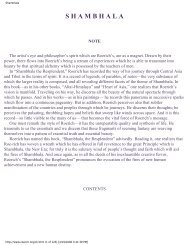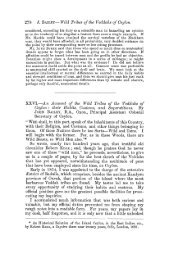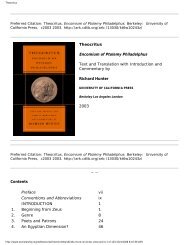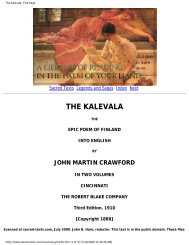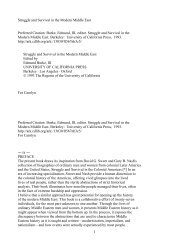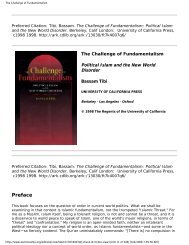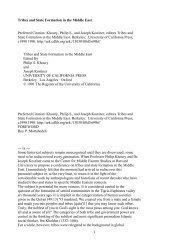Between Two Worlds Kafadar.pdf
Between Two Worlds Kafadar.pdf
Between Two Worlds Kafadar.pdf
You also want an ePaper? Increase the reach of your titles
YUMPU automatically turns print PDFs into web optimized ePapers that Google loves.
gazis, warriors of the faith, who spread across the frontier areas as Seljuk<br />
power diminished and formed aspiring emirates, among which the band led by Osman<br />
Gazi carried the day because of its fortunate position. The earliest Ottoman<br />
sources, an inscription from 1337 and Ahmedi's chronicle, completed ca. 1410,<br />
both full of references to the House of Osman as gazis, confirmed in Wittek's<br />
opinion the significance of the gaza ethos for the early Ottoman thrust.<br />
These gazi bands may have drawn members from some tribes but were not composed<br />
of tribal groups as such; rather, they consisted of warrior-adventurers from<br />
various backgrounds. In relation to the Mentese emirate, for instance, he had<br />
argued that the "gazi pirates" who founded this stateling were "originally a<br />
mixture of Turks and indigenous elements from the neighborhood of Byzantine<br />
territory" who were soon joined by "a large number of Byzantine mariners ...<br />
owing to their unemployment."[21] To borrow more recent terminology, gazi bands<br />
were "inclusive" entities for Wittek, and tribes were not. Since he held that<br />
tribalism required consanguinity (which, he argued, later Ottoman genealogies<br />
were unable to establish anyway), and since the warrior bands whom he deemed<br />
responsible for the creation of the principalities were anything but<br />
consanguineous, he rejected the notion that a tribe could have been instrumental<br />
in the foundation of the Ottoman state. The cohesiveness of the<br />
political-military cadres of the emirates came from shared goals and faith, not<br />
blood.<br />
The differences between Köprülü and Wittek were never explicitly discussed in<br />
later scholarship because the issue was encumbered by nationalistic or<br />
counternationalistic consideratious. From that viewpoint, the role of Byzantine<br />
"dissidents" and converts in one of the major political achievements of<br />
Turco-Muslim civilization was obviously a highly charged issue. The Polemic<br />
against Western historiography, which often tended to show Turks as uncreative<br />
barbarians, should be an object of inquiry in itself as part of late<br />
Ottoman/early republican intellectual history. (And its intensity must be seen<br />
against the fact that Western historiography had been particularly aggressive in<br />
its attempt to barbarize and delegitimize the "Turkish" empire, with territories<br />
right within the European continent and lording it over Christian peoples.)<br />
Köprülü,<br />
― 39 ―<br />
from his youthful poetry to his postacademic career as a politician, was<br />
certainly part of that discourse as an outspoken nationalist (though his<br />
nationalism was different from the official version in many ways). Before his<br />
lectures on the rise of the Ottoman state, he had published what turned out to<br />
be a highly influential study criticizing then prevalent views with respect to<br />
Byzantine influences on Ottoman institutions, primarily in the administrative<br />
sphere.[22] Given all this, Köprülü's account of the Ottoman foundations, where<br />
he insisted on the presence of a lineage-based tribe as well as an ethnic stock<br />
and spoke against emphasizing the conversions, was very easy to read as<br />
nationalistic propaganda. And indeed his book is not free of blatant excesses.<br />
On the other hand, Köprülü's version of events lacked the convenience of a<br />
singular "motive force." Shaped under the influence of the Durkheimian tradition<br />
39




